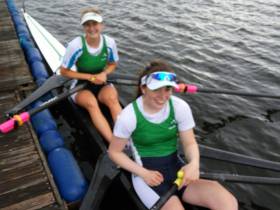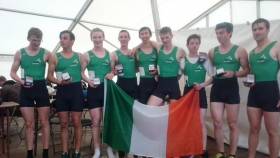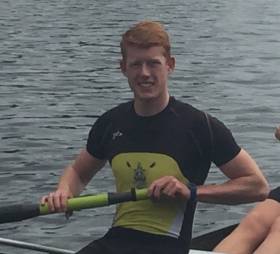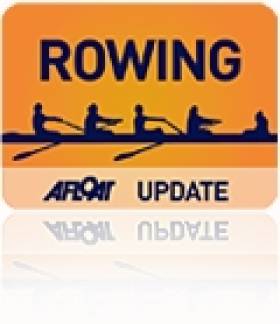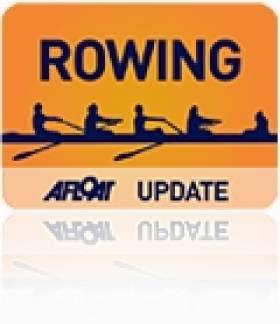Displaying items by tag: Home International
Four Wins for Ireland at Home International Regatta UPDATE
#Rowing: The Ireland junior men’s eight topped off a series of four Ireland wins – all at junior level – at the Home International Regatta in Strathclyde Park in Scotland. They beat Scotland by just over two seconds, while England came in one second further back.
Thomas Hume and Sam Reidy, both from Coláiste Íognáid, were winning their second gold. They had been the best junior men’s pair – coming home more than 20 seconds faster than Scotland, who were second.
Holly Davis (14) also had a big win on her debut at international level. The Lee Valley girl had almost 12 seconds to spare over second-placed Ellie Cushen of England in the junior women’s single sculls race.
The junior men’s quadruple also pushed England into second in their race – but by a finer margin. The crew of Dara Kelly (Lee), Tiarnan McKnight (Three Castles) and Colum Brennan and Ronán Brennan of Neptune won by 1.21 seconds from England.
Home International Regatta – Strathclyde Park, Scotland: Final Standings:
Men – Senior: 1 Scotland 33 pts; 3 Ireland 22. Jun: 1 Scotland 21; 3 Ireland 19.
Women – Sen: 1 Scotland 33; 4 Ireland 13. Jun: 1 England 26; 2= Ireland, Scotland 17.
#Rowing: Ireland won the senior men’s title at the Home International Regatta at the National Rowing Centre today.
The men’s senior eight sealed the deal with a terrific win over Scotland, their closest rivals in the race and on the points table. A win for Scotland would have given them the honours.
The Ireland senior women came very close to winning the overall prize. The women’s quadruple – in the same manner as the men’s - had won the previous race, and the senior women’s eight knew that a win in the eight would have tied the points with England, but secured the big prize by virtue of the win in this key race. However, England produced a fine performance to win.
In all, Ireland had 10 wins at the regatta: the men’s four and coxed four, the pair and the quadruple won, in addition to the eight. The women’s four and the pair won, as did single sculler Selma Bouanane – by under a third of a second from Fiona Bell of Queen’s, who was rowing for Scotland.
England were in charge in both the junior men’s and junior women’s events.
Home International Regatta, National Rowing Centre, Cork (Selected Results; Irish placings: All Irish results unless stated)
Overall
Men – Senior: Ireland 30 pts, Scotland 30, England 20, Wales 15. Ireland win on basis of eights’ win. Junior: England 26, Ireland 17, Scotland 14, Wales 13.
Women – Senior: England 27, Ireland 27, Wales 20, Scotland 18. England win on basis of eights’ win. Junior: England 26, Ireland 18, Scotland 16, Wales 6.
Men – Eight: 1 Sean O’Sullivan, C Hennessy, Stephen O’Sullivan, J Quinlan, P Munnelly, T Power, D Joyce, P Moreau; cox: C O’Connell 6:01.31, 2 Scotland 6:07.10, 3 England 6:07.71. Junior: 3 Ireland 6:15.55.
Four – 1 T Power, Sean O’Sullivan, Stephen O’Sullivan, C Hennessy 6:18.37. Jun: 3 M Campion, D Ryan, B Frohburg, S Daly 6:46.28.
Four, coxed: 1 P Munnelly, J Quinlan, C Murphy, N Herlihy; cox: C O’Connell 6:44.97. Jun: 3 J Kennedy, P Murphy, R Mills, M Stewart, C Wanjau 6:52.22.
Pair – 1 D Joyce, P Moreau 7:02.03
Lightweight: 3 M Farrell, C Flynn 7:21.01. Jun: 1 S O’Neill, W Ronayne 7:05.14.
Sculling, Quadruple: 1 D Larkin, A Christie, N Hull, K Mannix 6:12.48. Jun: 2 D Kelly, T Kelly, A Sheehan, L Flynn 6:24.19.
Double – 2 N Hull, A Christie 6:47.38.
Lwt: 2 C McCrae, C O’Connell. Jun: 3 T Orlic, S Byrne 7:03.41.
Single: 3 K Mannix 7:23.51.
Lightweight Single: 3 D Larkin 7:36.9.
Junior, Single: 3 L Sutton 7:47.798.
Women
Eight: 1 England 6:48.44, 2 Ireland 6:52.35, 3 Scotland 6:56.69. Junior: 2 Ireland 6:51.598.
Four: 1 D Maguire, C Dempsey, C Feerick, K Shirlow 6:58.83.
Jun: 3 Z McCutcheon, C Fee, N Silke, S Byrnes 7:21.29.
Four, coxed: 4 R Gilligan, R Ryan, A Corcoran, S Kelly; cox: A Reid 7:40.76. Jun: 3 A Brooks, C Kirwan, A Cummins, J Crowley, S Dolan 7:38.62.
Pair – 1 N Casey, A McCarthy 7:44.299. Lightweight: 4 E Brogan, K McCarthy 8:33.09. Junior: 2 R O’Donoghue, A Tyther 7:57.62.
Sculling, Quadruple; Senior: 1 S Bounane, G O’Brien, S Crummey, O Hayes 6:53.69. Jun: 2 N Kiely, S Tierney, K Dolan, S Scully 7:12.40.
Double – 2 G O’Brien, S Crummey 7:31.69. Lwt: 3 S Clavin, V Wallace 7:54.82. Jun: M Kidney, A Lynch 7:47.67.
Single: 1 S Bouanane 8:04.81. Lightweight Single: 2 O Hayes 8:24.7. Junior, Single: 2 C O’Brien 8:25.1
Ireland Team Chosen for Home International Rowing Regatta
#Rowing: The Ireland senior team for the 2018 Home International Regatta has been chosen. The event will be held at the National Rowing Centre next Saturday, July 21st. Ireland, England, Scotland and Wales will compete to win the Victor Ludorum – ‘the winner of the games’ – in four categories: senior men, senior women, junior men and junior women.
Irish crews had six wins at the 2017 regatta in Scotland and the junior men and junior women were both second overall. England won in all but one category, with Scotland beating them to the top of the senior women’s table.
For some Irish athletes, the Home International has been the pinnacle of their rowing career; for others a first step on the road to World and Olympic Championships. Gary and Paul O Donovan began their journey to Olympic medal glory in this regatta.
Racing begins at 10:00am on Saturday, and runs until 4pm that afternoon.
Senior Men’s Sculling Team:
Keelan Mannix (Skibbereen RC)
Aaron Christie (Bann RC)
Nathan Hull (Queens University Belfast BC)
Dara Larkin (UCC RC)
Callum Macrae (Methodist College Belfast RC)
Coman O’Connell (UCD BC)
Senior Men’s Sweep Rowing Team:
Patrick Munnelly / James Quinlan (NUIG BC / Castleconnell RC)
Tomas Power / Sean O’Sullivan (Cork BC)
Stephen O’Sullivan / Colm Hennessy (Shandon BC)
Patrick Moreau / David Joyce (Commercial RC)
Niall Herlihy / Cameron Murphy (UCD BC)
Michael Farrell / Conor Flynn (NUIG BC)
Cormac O’Connell (UCC RC) Cox
Senior Women’s ScullingTeam:
Selma Bouanane (Fermoy RC)
Georgia O’Brien (UL RC)
Sarah Crummey (Belfast BC)
Orla Hayes (Skibbereen RC)
Sheila Clavin (St Michaels RC)
Vikki Wallace (QUBBC)
Senior Women’s Sweep Team:
Niamh Casey / Aine McCarthy (Skibbereen RC)
Claire Feerick / Katie Shirlow (Neptune RC / Bann RC)
Caoimhe Dempsey / Dineka Maguire (DULBC)
Rachel Ryan / Ruth Gilligan (Commercial RC)
Sarah Kelly / Aoife Corcoran (DULBC)
Aoife Reid (Commercial RC) Cox
Womens Lightweight Pair
Ella Brogan, Queens University Boat Club
Katie McCarthy, Cork Boat Club
Junior Men’s Sculling Team:
Dara Kelly (Lee)
Thomas Kelly (Kenmare)
Andrew Sheehan (Lee)
Luke Flynn (Three Castles)
Tristan Orlic (Neptune)
Sean Byrne (Neptune)
Luke Sutton (New Ross)
Coach: Colm Butler (Neptune)
Junior Men’s Sweep Team:
Jack Kennedy (Enniskillen)
Peter Murphy (Enniskillen)
Robbie Mills (Enniskillen)
Michael Stewart (Enniskillen)
Cliff Wanjau (NUIG)
Michael Campion (Commercial)
Damien Ryan (Castleconnell)
Ben Frohburg (Castleconnell)
Sam Daly (Commercial)
Sam O’Neill (Shandon)
Will Ronayne (Shandon)
Junior Women’s Sculling Team
Marie Kidney (Lee)
Niamh Kiely (Castleconnell)
Clara O'Brien (Castleconnell)
Shona Tierney (New Ross)
Aoife Lynch (Lee)
Katie Dolan (Commercial)
Sadhbh Scully (Carlow)
Janet Walsh (New Ross)
Junior Women’s Sweep Team:
Aoife Brooks (Shandon)
Chris Kirwan (St. Michaels)
Rhianon O'Donoghue (Killorglin)
Anna Tyther (Killorglin)
Zoe McCutcheon (Enniskillen)
Caitlyn Fee (Enniskillen)
Aoife Cummins (Lee)
Jennifer Crowley (Lee)
Norma Silke (Castleconnell)
Saoirse Byrnes (Castleconnell)
Sarah Dolan (Enniskillen)
#Rowing: Ireland picked up more wins at the Home International Regatta in Strathclyde today. Early in the day they had won the women’s and men’s lightweight pairs. The women’s senior double of Chloe Mehigan (Cork) and Claire Feerick (Neptune) won a good battle with Scotland to take the senior women’s double, and Ireland’s junior four of Mia Jane Elliot, Zoe McCutcheon, Caitlyn Fee and Miriam Kelly also won. They are all Enniskillen rowers.
Home International Regatta, Strathclyde (Ireland Winners; early)
Men
Lightweight Pair: C Hennessy, S O’Sullivan
Women
Double: C Mehigan, C Feerick
Lightweight Pair: G Crowe, H O’Neill
Junior – Four: MJ Elliot, Z McCutcheon, C Fee, M Kelly
Ireland Travel in Hope to Home International Regatta
The 2016 Home International Regatta takes place tomorrow in Cardiff Bay, Wales. Ireland, England, Scotland and Wales will compete to win the Victor Ludorum – or ‘the winner of the games’- in four categories: Senior Men, Senior Women, Junior Men and Junior Women. Last year in Strathclyde, Scotland won the title for senior men and Ireland the Junior Men, while England claimed both the Senior Women and Junior Women’s titles.
The event is now in its 54th year, and has been, for some, the pinnacle of their rowing career. For others - including Sean Drea and Steve Redgrave - it was a first step on the road to World and Olympic Championships. It offers the unique opportunity to watch and engage with top level athletes just weeks before the eyes of the world descend on Rio for the Olympic Games this year.
The course runs from the Penarth end of Barrage to finish at Mermaid Quay, and the open viewing and easy access for spectators means the Home International Regatta at Cardiff Bay is one of the best for showcasing the sport of rowing.
The Irish Team is as follows:
Senior Men Sweep Team: Luke McCann (QUB BC,) Miles Taylor (QUB BC), Ciaran Higgins (UCC RC), Simon Kearney (UCC RC), Barney Rix (Portora BC), Ryan Ballantine (Portora BC), Lloyd Seaman (Portora BC), Cormac McLaughlin (Portora BC), Ross Thompson (UCD BC), Niall Farrell (UCD BC), David Keohane (UCC RC), Brian Keohane (UCC RC), Cox: Gavin Connolly (Commercial RC), Coach: Paul Thornton (UCC RC)
Senior Men Sculling Team: Damien Kelly (Garda BC), Tom Dillon (NUIG BC), Alan Prendergast (Shandon BC), Dan Begley (Shandon BC), Andrew O’Connor (Castleconnell BC), Hugh Sutton (Lee RC), Coach: Martin Kilbane (Cork BC)
Senior Women Sweep Team: Dineka Maguire (Bann RC), Katie Shirlow (Bann RC), Gill Crowe (DULBC), Hazel O’Neill (DULBC), Aifric Keogh (UCC RC), Caoimhe Joyce Hearne (UCC RC), Aoife Feeley (UCC RC), Roisin Maguire (QUBLBC), Lauren McHugh (DULBC), Sarah Higgins (DULBC), Rebecca Davidson (QUBLBC), Siofra Corr (QUBLBC), Cox: Gemma Canham (QUBLBC), Coach: Andrew Coleman (DULBC)
Senior Women Sculling Team: Marie Piggott (NUIG BC), Lydia Heaphy (Skibbereen RC), Olivia Blundell (Belfast BC), Selma Bouanane (Fermoy RC), Cliodhna Nolan (Carlow RC), Aoife Byrne (Carlow RC), Coach: John Armstrong (Belfast BC)
Junior Men Sweep Team: Alan O’Keeffe (Presentation RC), Rory Tummons (St Josephs RC), Gerry Mannion (St Josephs RC), James Foster (Portora BC), Aaron Christie (Bann RC), Rory Gilligan (Hampton School -UK), Brion O’Rourke (St Josephs RC), Ben McKeon (St Michaels RC) Cox: Cliff Wanjau (St Josephs RC), Jack Stacey (Commercial RC), Edward Meehan (Commercial RC), Coach: John Walsh (St Josephs RC)
Junior Men Sculling Team: Fergal O’Sullivan (Cork BC), Darragh Larkin (Lee RC), Cathal Cummins (Lee Valley RC), Oisin Nolan (Carlow RC), Liam O’Connell (Cork BC), Gavin Morrison (Fermoy RC), Dylan Mitchell (Belfast BC), Coach: Ray Morrison (Fermoy RC)
Junior Women Sweep Team: Lucy McIntyre (Methodist BC), Rachel McBrinn (Methodist BC), Megan Tully (Shannon RC), Megan Carmody (Shannon RC), Miriam Kelly (Portora BC), Mia Jane Elliott (Portora BC), Siobhan Maxwell (Commercial RC), Aisling Keogh (Commercial RC), Maebh Heaney (Lee RC), Mia Kovacs (Shandon BC), Cox: Hannah Adams (Methodist BC), Coach: Mike Reidy (Commercial RC)
Junior Women Sculling Team: Claire Synnott (Lee RC), Claire Ferrick (Neptune RC), Caoileann Nic Dhonncha (Col Iognaid RC), Julia Vascotto (Castleconnell BC), Aoibhinn Keating (Skibbereen RC), Georgia O’Brien (Kenmare RC), Alana O’Donovan (Bann RC), Coach: Amy Phelan (Col Iognaid)
Ireland Home International Team Chosen
#Rowing: The Ireland team for the Home International Regatta in Cardiff Bay on July 23rd has been chosen. The men’s senior four is an all-Portora unit and these rowers go into a strong-looking senior eight, with UCC.
Ireland senior team for Home International Regatta, Cardiff Bay, July 23rd. Not necessarily in crew order.
Men
Eight: D Keohane, B Keohane, B Rix, R Ballantine, L Seaman, C McLaughlin, R Thompson, N Farrell; cox: G Connolly. Four: Rix, Ballantine, Seaman, McLaughlin. Four, coxed: B Keohane, D Keohane, Farrell, Thompson; cox: Connolly. Pair: L McCann, M Taylor. Lightweight Pair: C Higgins, S Kearney.
Sculling – Quadruple: T Dillon, A Prendergast, D Begley, D Kelly. Double: Prendergast, Begley. Lightweight Double: A O’Connor, H Sutton. Single: Kelly. Lightweight Single: Dillon.
Women
Eight: G Crowe, H O’Neill, A Keogh, C Joyce Hearne, D Maguire, K Shirlow, L McHugh, S Higgins; cox: G Canham. Four: Keogh, Joyce Hearne, A Feeley, R Maguire. Four, coxed: McHugh, Higgins, R Davidson, S Corr; cox: Canham. Pair: D Maguire, Shirlow. Lightweight Pair: Crowe, O’Neill.
Sculling
Quadruple: O Blundell, M Piggott, S Bouanane, A Byrne. Double: Blundell, Bouanane, Lightweight Double: C Nolan, Byrne. Single: Piggott. Lightweight Single: L Heaphy.
#HomeInternationalRowing: Ireland had to be content with second places both in crew terms and in overall categories at the Home International Regatta in Nottingham. England had a clean sweep, winning both the senior men’s and women’s categories and the junior men’s and women’s. Ireland senior men and junior women filled the runners-up spots; the senior women finished fourth and the junior men third.
The men’s junior pair of Ryan McKenna and Alex Chadfield from Clonmel won, as did the Ireland junior women’s eight. Twelve Ireland crews finished second in their races.
Irish Junior Women Win at Home International Rowing
Ireland successfully defended their Junior Women's title at the Home International Regatta in Scotland on Saturday. However, England took the other three categories, and Ireland could only finish fourth in the men's senior ranks and third in the women's. The junior men finished second.
Home International Regatta, Saturday:
Overall – Men, Senior: 1 England, 2 Wales, 3 Scotland, 4 Ireland. Junior: 1 England, 2 Ireland, 3 Wales.
Women, Senior: 1 England, 2 Scotland, 3 Ireland. Junior: 1 Ireland, 2 England, 3 Scotland.
| 2011, STRATHCLYDE PARK – RESULTS |
|---|
| Race: 1 Women's Lightweight Single Scull (1 WLwt 1x) F 2000m |
| 500m 1000m 1500m FINISH |
| 1 8 IRE(-) Ireland 01:54.5 03:55.4 - 8:03.57 |
| 2 7 ENG(-) England 01:55.8 04:00.0 - 8:17.41 |
| 3 6 WAL(-) Wales - Charles 02:00.0 04:05.4 - 8:19.39 |
| Danni Charles |
| 4 5 SCO(-) Scotland - Connal 02:02.7 04:11.4 - 8:39.18 |
| Gillian Connal |
| Race: 2 Men's Lightweight Single Scull (2 MLwt 1x) F 2000m |
| 500m 1000m 1500m FINISH |
| 1 7 WAL(-) Wales - Fernhead - - - 7:06.70 |
| Nick Fernhead |
| 2 5 SCO(-) Scotland - Scrimgeour - - - 7:10.64 |
| Sam Scrimgeour |
| 3 8 ENG(-) England - - - 7:30.86 |
| 4 6 IRE(-) Ireland - - - 7:30.91 |
| Race: 3 Women's Junior Single Scull (3 WJu18 1x) F 2000m |
| 500m 1000m 1500m FINISH |
| 1 6 IRE(-) Ireland 01:56.5 04:01.6 06:08.7 8:16.72 |
| 2 5 ENG(-) England 02:01.4 04:05.4 06:09.4 8:17.27 |
| 3 8 SCO(-) Scotland - McDonald 02:01.7 04:09.2 06:20.6 8:30.70 |
| Emma McDonald |
| Race: 4 Men's Junior Single Scull (4 OJu18 1x) F 2000m |
| 500m 1000m 1500m FINISH |
| 1 8 WAL(-) Wales - Massey 01:48.1 03:39.2 05:31.8 7:28.45 |
| Robbie Massey |
| 2 6 ENG(-) England 01:52.4 03:45.1 05:39.6 7:39.23 |
| 3 5 SCO(-) Scotland - Zankreyser 01:50.3 03:45.6 05:42.7 7:39.87 |
| David Zankreyser |
| 4 7 IRE(-) Ireland 01:44.6 03:37.7 05:37.3 8:47.10 |
| Race: 5 Women's Single Scull (5 W1x) F 2000m |
| 500m 1000m 1500m FINISH |
| 1 7 ENG(-) England 01:51.1 03:48.1 05:48.7 7:50.37 |
| 2 6 SCO(-) Scotland - Sanjana 01:54.6 03:52.0 05:53.0 7:55.30 |
| Francesca Sanjana |
| 3 8 IRE(-) Ireland 01:52.8 03:53.2 05:57.4 8:01.49 |
| 4 5 WAL(-) Wales - Chin 01:57.1 04:02.5 06:11.0 8:18.33 |
| Rebecca Chin |
| Race: 6 Men's Single Scull (6 M1x) F 2000m |
| 500m 1000m 1500m FINISH |
| 1 5 WAL(-) Wales - Thomas 01:44.8 03:33.7 05:23.4 7:19.10 |
| Graeme Thomas |
| 2 7 IRE(-) Ireland 01:45.7 03:37.6 05:30.3 7:23.61 |
| 3 6 ENG(-) England 01:46.7 03:37.8 05:30.0 7:25.81 |
| 4 8 SCO(-) Scotland - McConnell 01:45.3 03:39.6 05:36.6 7:30.09 |
| Andrew McConnell |
| Race: 7 Women's Lightweight Coxless Pair (7 WLwt 2-) F 2000m |
| 500m 1000m 1500m FINISH |
| 1 7 SCO(-) Scotland 01:51.3 03:47.8 05:47.2 7:48.71 |
| Alex Gemie, Judith Anne Herbert |
| 2 5 WAL(-) Wales 01:53.0 03:52.5 05:50.6 7:54.95 |
| Rebekah Edgar, Lorna Brown |
| 3 6 ENG(-) England 01:54.7 03:55.5 05:58.1 8:01.14 |
| Race: 8 Men's Lightweight Coxless Pair (8 MLwt 2-) F 2000m |
| 500m 1000m 1500m FINISH |
| 1 5 ENG(-) England 01:42.0 03:29.1 05:17.3 7:03.61 |
| 2 6 IRE(-) Ireland 01:43.1 03:30.9 05:20.3 7:07.92 |
| 3 7 SCO(-) Scotland 01:43.6 03:33.4 05:27.1 7:20.01 |
| Elliott Clarke, Patrick Murray |
| 4 8 WAL(-) Wales 01:44.9 03:35.2 05:29.6 7:23.10 |
| Ben Redman |
| Race: 9 Women's Junior Coxless Pair (9 WJu18 2-) F 2000m |
| 500m 1000m 1500m FINISH |
| 1 8 IRE(-) Ireland 01:51.8 03:51.0 05:54.5 7:57.59 |
| 2 7 SCO(-) Scotland 01:51.1 03:53.4 06:00.4 8:03.37 |
| Jo Smith, Eilidh Manson |
| 3 6 ENG(-) England 02:03.2 04:08.2 06:14.9 8:15.33 |
| 4 5 WAL(-) Wales 02:00.5 04:05.3 06:12.8 8:17.54 |
| Lizzie Williams, Holly Oughton |
| Race: 10 Men's Junior Coxless Pair (10 OJu18 2-) F 2000m |
| 500m 1000m 1500m FINISH |
| 1 5 SCO(-) Scotland 01:42.3 03:28.0 05:10.7 6:56.23 |
| Ross Urquhart, Ronan Murphy |
| 2 7 IRE(-) Ireland 01:40.7 03:26.0 05:11.6 6:57.86 |
| 3 8 ENG(-) England 01:42.8 03:30.9 05:20.1 7:12.73 |
| 4 6 WAL(-) Wales 01:47.2 03:38.3 05:32.4 7:23.38 |
| Charles Hillman, Sam Kerr |
| Race: 11 Women's Coxless Pair (11 W2-) F 2000m |
| 500m 1000m 1500m FINISH |
| 1 8 ENG(-) England 01:54.7 03:49.6 05:46.4 7:45.28 |
| 2 5 SCO(-) Scotland 01:53.6 03:48.9 05:48.1 7:49.30 |
| Natalie Irvine, Gillian Connal |
| 3 7 WAL(-) Wales 01:58.0 03:52.6 05:51.2 7:49.64 |
| Rebekah Edgar, Lorna Brown |
| 4 6 IRE(-) Ireland 01:54.2 03:54.1 05:53.3 7:58.66 |
| Race: 12 Men's Coxless Pair (12 M2-) F 2000m |
| 500m 1000m 1500m FINISH |
| 1 5 SCO(-) Scotland 01:42.1 03:29.3 05:10.7 6:56.41 |
| Scott Purdie, Colin Wallace |
| 2 7 ENG(-) England 01:38.3 03:24.4 05:11.8 6:58.43 |
| 3 6 IRE(-) Ireland 01:41.4 03:27.1 05:12.8 7:00.89 |
| 4 8 WAL(-) Wales 01:44.4 - 05:13.9 7:08.72 |
| Will Todd, Ben Spencer-Jones |
| Race: 13 Women's Junior Coxless Four (13 WJu18 4-) F 2000m |
| 500m 1000m 1500m FINISH |
| 1 5 ENG(-) England 01:48.8 03:34.6 05:23.8 7:17.58 |
| 2 8 IRE(-) Ireland 01:46.2 03:42.8 05:38.1 7:33.66 |
| 3 7 SCO(-) Scotland 01:46.9 03:40.1 05:36.9 7:36.43 |
| Joanna Tink, Emma Rankin, Robyn Gillies, Emily Colley |
| 4 6 WAL(-) Wales 01:50.3 03:46.5 05:45.6 7:46.33 |
| Abi Thomas, Grace Thomas, Elizabeth Williams, Holly Oughton |
| Race: 14 Men's Junior Coxless Four (14 OJu18 4-) F 2000m |
| 500m 1000m 1500m FINISH |
| 1 7 ENG(-) England 01:40.7 - 04:46.1 6:24.70 |
| 2 8 WAL(-) Wales 01:41.3 - 04:47.7 6:30.10 |
| Bowen Stuart-Woods, Ed Hares, Charles Waite-Roberts, James Moggridge |
| 3 5 IRE(-) Ireland 01:41.9 - 04:53.3 6:35.14 |
| 4 6 SCO(-) Scotland 01:45.0 - 05:03.7 6:49.60 |
| Elliot Bruce, Lewis McCue, Cameron Gordon, Jacob Vyse |
| Race: 15 Women's Coxed Four (15 W4+) F 2000m |
| 500m 1000m 1500m FINISH |
| 1 5 ENG(-) England 01:47.5 03:38.4 05:30.5 7:21.40 |
| 2 6 IRE(-) Ireland 01:48.6 03:41.7 05:37.9 7:32.27 |
| 3 7 SCO(-) Scotland 01:51.4 03:45.7 05:41.6 7:36.72 |
| Ruth Dunn, Samantha Fowler, Hannah Stone, Rosie Young, Karen Barton |
| Race: 16 Men's Coxed Four (16 M4+) F 2000m |
| 500m 1000m 1500m FINISH |
| 1 5 ENG(-) England 01:35.5 03:11.0 04:51.3 6:32.90 |
| 2 8 WAL(-) Wales 01:37.4 03:15.2 04:58.2 6:38.80 |
| 3 6 IRE(-) Ireland 01:36.3 03:14.8 05:00.2 6:40.54 |
| 4 7 SCO(-) Scotland 01:38.0 03:20.3 05:04.7 6:49.53 |
| Gary Wilson, Feargal OShea, Tom Macintyre, Thomas Little, Rhi Morgan |
| Race: 17 Women's Lightweight Double Scull (17 WLwt 2x) F 2000m |
| 500m 1000m 1500m FINISH |
| 1 6 ENG(-) England 01:44.9 03:19.6 05:26.7 7:24.53 |
| 2 5 SCO(-) Scotland 01:50.8 03:35.4 05:40.5 7:37.68 |
| Judith Anne Herbert, Alex Gemie |
| 3 8 IRE(-) Ireland 01:49.7 03:45.6 05:45.6 7:40.48 |
| 4 7 WAL(-) Wales 01:55.4 03:46.3 05:52.1 7:52.86 |
| Race: 18 Men's Lightweight Double Scull (18 MLwt 2x) F 2000m |
| 500m 1000m 1500m FINISH |
| 1 8 ENG(-) England - - - 10:00.00 |
| 2 7 IRE(-) Ireland - - - 20:00.00 |
| 3 6 WAL(-) Wales - - - 30:00.00 |
| 4 5 SCO(-) Scotland - - - 40:00.00 |
| Matthew Loader, Sam Scrimgeour |
| Race: 19 Women's Junior Double Scull (19 WJu18 2x) F 2000m |
| 500m 1000m 1500m FINISH |
| 1 7 SCO(-) Scotland 01:50.9 03:47.9 05:46.5 7:46.57 |
| Emma McDonald, Olivia Davison |
| 2 6 ENG(-) England 01:51.6 03:51.5 05:50.4 7:53.62 |
| 3 8 IRE(-) Ireland 01:49.9 03:52.4 05:54.2 7:56.70 |
| 4 5 WAL(-) Wales 01:53.4 03:57.1 06:03.4 8:14.95 |
| Race: 20 Men's Junior Double Scull (20 OJu18 2x) F 2000m |
| 500m 1000m 1500m FINISH |
| 1 8 ENG(-) England 01:38.0 03:19.8 05:03.1 6:43.25 |
| 2 6 IRE(-) Ireland 01:39.8 03:19.5 05:02.4 6:43.52 |
| 3 7 SCO(-) Scotland 01:37.7 03:22.1 05:07.7 6:49.64 |
| Harry Leask, Jack Leask |
| 4 5 WAL(-) Wales 01:37.4 03:30.4 05:34.4 7:49.10 |
| Race: 21 Women's Double Scull (21 W2x) F 2000m |
| 500m 1000m 1500m FINISH |
| 1 8 ENG(-) England 01:50.8 03:34.1 05:29.0 7:24.31 |
| 2 5 IRE(-) Ireland 01:43.6 03:43.9 05:39.7 7:33.79 |
| 3 6 SCO(-) Scotland 01:52.0 03:47.8 05:43.0 7:37.73 |
| Amanda Larcombe, Francesca Sanjana |
| 4 7 WAL(-) Wales 01:49.8 03:48.0 05:46.6 7:43.03 |
| Race: 22 Men's Double Scull (22 M2x) F 2000m |
| 500m 1000m 1500m FINISH |
| 1 8 WAL(-) Wales 01:40.7 03:19.5 05:01.0 6:43.95 |
| 2 7 SCO(-) Scotland 01:40.1 03:18.4 05:03.4 6:45.89 |
| Daniel Graham, Michael McNaul |
| 3 6 ENG(-) England 01:41.3 03:25.0 05:03.9 6:48.53 |
| 4 5 IRE(-) Ireland 01:42.7 - 05:10.8 6:58.12 |
| Race: 23 Women's Junior Coxed Four (23 WJu18 4+) F 2000m |
| 500m 1000m 1500m FINISH |
| 1 7 IRE(-) Ireland 01:48.7 03:42.5 05:38.1 7:34.38 |
| 2 8 SCO(-) Scotland 01:51.2 03:48.1 05:46.7 7:45.35 |
| Jamie Rees, Emily Geddes, Holly W. Reid, Christie J. Duff, Alistair Frost |
| 3 6 ENG(-) England 01:53.6 03:52.1 05:52.8 7:53.57 |
| 4 5 WAL(-) Wales 01:56.5 03:57.5 05:58.4 8:03.85 |
| Race: 24 Men's Junior Coxed Four (24 OJu18 4+) F 2000m |
| 500m 1000m 1500m FINISH |
| 1 6 IRE(-) Ireland 01:35.0 03:13.1 05:08.6 6:37.32 |
| 2 7 ENG(-) England 01:38.0 03:19.2 05:09.0 6:40.62 |
| 3 5 WAL(-) Wales 01:36.9 03:18.2 05:09.5 6:42.66 |
| 4 8 SCO(-) Scotland 01:38.2 03:21.7 05:10.2 6:50.45 |
| Callum Stephen, Matthew Rankin, Ian Walker, Euan Marshall, Rebecca Moore |
| Race: 25 Women's Under 23 Coxless Four (25 WU23 4-) F 2000m |
| 500m 1000m 1500m FINISH |
| 1 8 ENG(-) England 01:40.5 03:57.3 05:16.2 7:03.90 |
| 2 7 SCO(-) Scotland 01:41.4 03:57.9 05:21.9 7:08.70 |
| Iona Riley, Lucy Bonnamy, Catriona Bain, Jamie Steel |
| 3 6 IRE(-) Ireland 01:42.9 03:58.5 05:19.3 7:12.12 |
| Race: 26 Men's Under 23 Coxless Four (26 MU23 4-) F 2000m |
| 500m 1000m 1500m FINISH |
| 1 7 SCO(-) Scotland 01:30.4 03:04.8 04:41.9 6:16.88 |
| Gary Wilson, Callum McBrierty, Sean Dixon, Murray Wilkojc |
| 2 8 ENG(-) England 01:32.3 03:07.2 04:43.1 6:18.58 |
| 3 5 WAL(-) Wales 01:31.0 03:06.3 04:47.0 6:21.13 |
| 4 6 IRE(-) Ireland 01:33.2 03:08.5 04:43.9 6:22.74 |
| Race: 27 Adaptive TA Women's Single Scull (27 WAdapt 1x TA) F 1000m |
| 500m 1000m 1500m FINISH |
| 1 7 SCO(-) Scotland - MacDonald - - 02:38.6 5:39.97 |
| Caroline MacDonald |
| 2 8 WAL(-) Wales - - 03:06.6 6:28.64 |
| Race: 28 Adaptive TA Men's Single Scull (28 MAdapt 1x TA) F 1000m |
| 500m 1000m 1500m FINISH |
| 1 7 ENG(-) England - - 02:15.1 4:48.65 |
| 2 8 SCO(-) Scotland - Stewart - - 03:08.2 6:43.95 |
| Graeme Stewart |
| Race: 29 Women's Junior Quadruple Scull (29 WJu18 4x) F 2000m |
| 500m 1000m 1500m FINISH |
| 1 7 ENG(-) England 01:42.9 03:28.8 05:18.8 7:09.15 |
| 2 6 IRE(-) Ireland 01:44.0 03:31.7 05:37.0 7:14.17 |
| 3 8 WAL(-) Wales 01:49.4 03:43.8 05:21.9 7:31.02 |
| 4 5 SCO(-) Scotland 01:54.0 03:45.9 05:40.2 7:35.54 |
| Claire Hiddleston, Lena Reid, Beth Simmonds, Katherine Shaw |
| Race: 30 Women's Junior Eight (30 WJu18 8+) F 2000m |
| 500m 1000m 1500m FINISH |
| 1 7 ENG(-) England 01:42.6 03:23.3 05:08.3 6:52.76 |
| 2 8 IRE(-) Ireland 01:43.6 03:25.2 05:12.0 6:57.17 |
| 3 6 SCO(-) Scotland 01:45.2 03:29.3 05:18.3 7:07.22 |
| Kimberley Somerside, Eleanor Jamieson, Jo Smith, Elidh Manson, Joanna Tink, Emma Rankin, Robyn Gillies, Emily Colley, Louise Henderson |
| Race: 31 Men's Junior Quadruple Scull (31 OJu18 4x) F 2000m |
| 500m 1000m 1500m FINISH |
| 1 8 ENG(-) England 01:32.2 03:05.1 04:43.1 6:19.15 |
| 2 7 IRE(-) Ireland 01:31.3 03:07.9 04:48.4 6:27.77 |
| 3 5 SCO(-) Scotland 01:34.6 03:14.3 04:56.2 6:30.61 |
| Jack Leask, Harry Leask, David Zankreyser, Gregor Hall |
| 4 6 WAL(-) Wales 01:33.3 03:10.6 04:52.5 6:32.53 |
| Race: 32 Men's Junior Eight (32 OJu18 8+) F 2000m |
| 500m 1000m 1500m FINISH |
| 1 8 ENG(-) England 01:24.1 02:51.5 04:23.2 5:53.32 |
| 2 7 WAL(-) Wales 01:26.2 02:56.3 04:28.9 5:59.60 |
| 3 5 IRE(-) Ireland 01:28.8 02:58.2 04:31.7 6:03.81 |
| 4 6 SCO(-) Scotland 01:29.4 03:02.8 04:40.7 6:17.42 |
| Iain Houston, Fraser Malone, Patrick Murray, Daniel McSherry, Grant J. Ross, Niall Rundle, Lewis McCue, Elliot Bruce, Emma Brander |
| Race: 33 Women's Quad Scull (33 W4x) F 2000m |
| 500m 1000m 1500m FINISH |
| 1 6 ENG(-) England 01:37.3 03:18.1 05:02.5 6:48.61 |
| 2 7 IRE(-) Ireland 01:40.3 03:24.4 05:10.7 6:55.69 |
| 3 5 WAL(-) Wales 01:42.7 03:29.5 05:17.1 7:01.38 |
| 4 8 SCO(-) Scotland 01:42.0 03:28.2 05:10.8 7:03.48 |
| Samantha Fowler, Rosie Young, Amanda Larcombe, Francesca Sanjana |
| Race: 34 Women's Eight (34 W8+) F 2000m |
| 500m 1000m 1500m FINISH |
| 1 7 ENG(-) England 01:37.9 03:19.4 05:02.0 6:44.03 |
| 2 8 SCO(-) Scotland 01:37.3 03:18.9 05:03.9 6:45.93 |
| Ruth Dunn, Hannah Stone, Natalie Irvine, Gillian Connal, Lucy Bonnamy, Catriona Bain, Iona Riley, Jamie Steel, Marianne Pascal-Flynn |
| 3 6 IRE(-) Ireland 01:39.9 03:22.0 05:04.7 6:47.48 |
| Race: 35 Men's Quad Scull (35 M4x) F 2000m |
| 500m 1000m 1500m FINISH |
| 1 6 ENG(-) England 01:31.1 03:02.5 04:34.8 6:07.44 |
| 2 7 WAL(-) Wales 01:32.5 03:03.6 04:35.9 6:07.90 |
| 3 8 SCO(-) Scotland 01:31.5 03:04.7 04:40.6 6:19.19 |
| Matthew Loader, Daniel Graham, Michael McNaul, Sam Scrimgeour |
| 4 5 IRE(-) Ireland 01:33.2 03:07.4 04:44.5 6:21.89 |
| Race: 36 Men's Eight (36 M8+) F 2000m |
| 500m 1000m 1500m FINISH |
| 1 8 ENG(-) England 01:23.9 02:51.6 04:23.0 5:52.73 |
| 2 7 WAL(-) Wales 01:26.1 02:56.2 04:28.3 6:01.07 |
| 3 5 IRE(-) Ireland 01:27.0 02:59.3 04:31.4 6:01.77 |
| 4 6 SCO(-) Scotland 01:26.4 02:57.8 04:29.5 6:01.84 |
| Andrew McConnell, Feargal OShea, Scott Purdie, Colin Wallace, Gary Wilson, Callum McBrierty, Sean Dixon, Murray Wilkojc, Kerra Templeton |


























